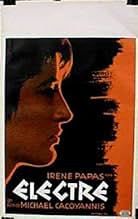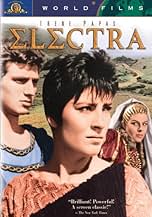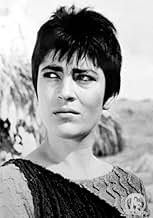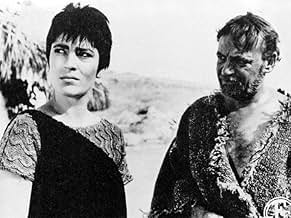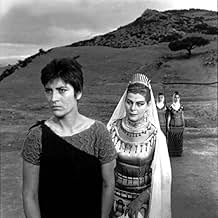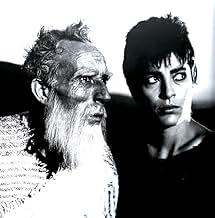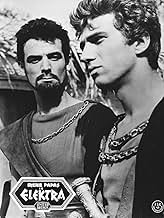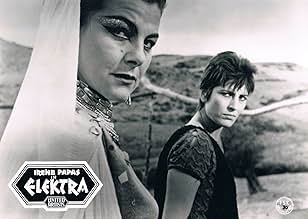CALIFICACIÓN DE IMDb
7.6/10
2 k
TU CALIFICACIÓN
Los hijos exiliados de un rey asesinado y destronado se reúnen para buscar venganza contra los responsables.Los hijos exiliados de un rey asesinado y destronado se reúnen para buscar venganza contra los responsables.Los hijos exiliados de un rey asesinado y destronado se reúnen para buscar venganza contra los responsables.
- Dirección
- Guionistas
- Elenco
- Nominado a 1 premio Óscar
- 11 premios ganados y 2 nominaciones en total
Fivos Razi
- Aegisthus
- (as Phoebus Rhazis)
- Dirección
- Guionistas
- Todo el elenco y el equipo
- Producción, taquilla y más en IMDbPro
Opiniones destacadas
I have just seen this film again via DVD after first seeing it in a cinema 40 years ago, and it remains in my view a staggering masterpiece of world cinema. It is a film that should be compulsory viewing by all aspiring film-makers since it is, unlike so many of today's movies which really are over influenced by television, so cinematic it makes one positively nostalgic for concepts like film grammar and form. Cunningly, it is almost a silent movie with a wonderful soundtrack, and the acting, (outstanding by all concerned), shows the great value of body language, and how good film editing, the use of a superb musical score, and excellent black and white cinematography can convey such powerful and poignant emotions. The play on which it is based has of course the soundest of psychological under-pinnings; guilt is an emotion and state of mind that can ONLY be experienced once one has done something horrendous enough to make it possess you. It cannot be imagined or anticipated, and, even when "rational" thought seems to justify the act, as Elektra and Orestes find to their cost, this evaporates instantly once that rage has been quenched. The final sequence of this film, after the mother has been murdered, and when these realisations manifest themselves is so overwhelming and powerful that only the hardest of heart could not be profoundly moved. But, like all good psycho-therapy, it is ultimately sanctifying, even if at the same time it is heart-breaking and almost unbearably poignant. Certainly one of the best films I have ever seen in my life, and every department deserves the highest praise and congratulations. One of the very few films to which I have awarded a 10/10 vote.
Euripides is the most 'modern' of the ancient dramatists in terms of his psychological penetration and the motives of his characters. This makes his plays ideally suited to the medium of film. Michael Cacoyannis set about the task of filming an Euripidean trilogy of 'Electra', 'The Trojan Women' and 'Iphigenia' of which 'Electra' is arguably the best. The score of Theodorakis, cinematography of Walter Lassally and a fabulous cast headed by Irene Papas as Electra, Yannis Fertis as Orestes, Aleka Katselli as Clytemnestra and Manos Katrakis as the Tutor all contribute to a stunning and mesmerising filmic experience. Cacoyannis, Lassally and Papas would go on to make 'Zorba the Greek' and Papas would play Helen and Clytemnestra for the same director.
Euripides wrote 'Electra' in about 420 bc and like those other masterpieces of the human mind 'Hamlet' and 'Phaedra', it is for all the ages. Let us be grateful to Cacoyannis for having given us this splendid version. Top marks.
Euripides wrote 'Electra' in about 420 bc and like those other masterpieces of the human mind 'Hamlet' and 'Phaedra', it is for all the ages. Let us be grateful to Cacoyannis for having given us this splendid version. Top marks.
Euripides pared to the essentials. Not one word, not one gesture is wasted. Nor is there ever an iota more than necessary.
A stark, spare study of despair in a sun blasted landscape that seems to watch over the pathetic efforts of humans with equal measures of timeless indifference and utter contempt. The characters in the story, the actors on the screen, and we in audience know what will happen next; but we are all powerless to prevent it. It is so intense that it makes Shakespeare's 'King Lear' seem almost frivolous.
It takes five minutes for the first two words to be spoken. 'Strike him!' Everything flows from that line. Another ten minutes of near silence passes before Electra appears. Her back to the camera, she turns to look over her shoulder - electricity is discharged. The audience gasps. Nothing is said but the implacable will is communicated. Nothing good is going to happen next.
It is almost a silent movie. They certainly have faces, to quote Gloria Graham from 'Sunset Boulevard.' By looks, by camera angles, by gestures, by the tensing of shoulders, the widening of eyes, make-up, fine photography, tight cutting, and very few words the tragedy unfolds.
It is always about Electra, to be sure, and Irene Pappas is a force of nature on the screen. She says little but each move, gesture, look, and word is supercharged.
Recommended for adults.
A stark, spare study of despair in a sun blasted landscape that seems to watch over the pathetic efforts of humans with equal measures of timeless indifference and utter contempt. The characters in the story, the actors on the screen, and we in audience know what will happen next; but we are all powerless to prevent it. It is so intense that it makes Shakespeare's 'King Lear' seem almost frivolous.
It takes five minutes for the first two words to be spoken. 'Strike him!' Everything flows from that line. Another ten minutes of near silence passes before Electra appears. Her back to the camera, she turns to look over her shoulder - electricity is discharged. The audience gasps. Nothing is said but the implacable will is communicated. Nothing good is going to happen next.
It is almost a silent movie. They certainly have faces, to quote Gloria Graham from 'Sunset Boulevard.' By looks, by camera angles, by gestures, by the tensing of shoulders, the widening of eyes, make-up, fine photography, tight cutting, and very few words the tragedy unfolds.
It is always about Electra, to be sure, and Irene Pappas is a force of nature on the screen. She says little but each move, gesture, look, and word is supercharged.
Recommended for adults.
Do I like this movie because it appeals to my lingering intellectual snobbery and belief that the old-time Greeks, particularly Euripides were onto something? I can't deny that it's part of the reason, but surely the staging and Walter Lassally's striking black-and-white photography and Irene Papas' smoldering performance help. I won't give my customary synopsis, because you shouldn't need it. Nowadays we are no longer familiar with the revenge drama, which fell out of favor after the 16th century, but if you've ever seen Hamlet, you know what it is, with its bloodiness that should soothe our own blood lust. Perhaps we need to make them more often these days, with everyone dying at the end. Perhaps it would ease some of the tensions of modern America; our politics all too often seem to be about hurting the right people; perhaps a dramatic version of the Sandy Hook Massacre would make people think twice. Or perhaps it would make them think "Boy, that's cool!"
Such deep philosophical questions aside, this one is worth it for the stark beauty of the torchlit night scenes, and the ancient, ruined landscape of modern Greece. Plus a heckuva story and performances.
Such deep philosophical questions aside, this one is worth it for the stark beauty of the torchlit night scenes, and the ancient, ruined landscape of modern Greece. Plus a heckuva story and performances.
From the first moment I saw the movie I rejoiced every bit of it : the crisp splendid black-and-white photography introducing an overwhelmingly barren landscape interacting with the drama we all know to come, the haunting "ancestral" score by Theodorakis, the impact of all sounds, the use of the choir with its laments and warnings and commentaries on everything and everybody, the tensions between good and evil mixed with love and hate, the unavoidable fate of the protagonists who cannot escape destiny as prescribed by bloodline and gods.
Besides being moved by too many unforgettable scenes enforced by splendid suggestive cutting (the actual murders, Electra's cutting her hair for the revenge to come, the confrontations between mother and daughter or brother and sister expressing their antagonistic emotions), the ultimate brilliance this masterpiece is Irene Papas outcry of grief and distress, the camera turning on itself as taking literally heaven and earth as her witness.
Appealing as strong to me as E. Munch's cry or Picasso's Guernica, I visited Mycene much later and still felt the movie's impact discovering this cursed place through Cacoyannis' lens.
Besides being moved by too many unforgettable scenes enforced by splendid suggestive cutting (the actual murders, Electra's cutting her hair for the revenge to come, the confrontations between mother and daughter or brother and sister expressing their antagonistic emotions), the ultimate brilliance this masterpiece is Irene Papas outcry of grief and distress, the camera turning on itself as taking literally heaven and earth as her witness.
Appealing as strong to me as E. Munch's cry or Picasso's Guernica, I visited Mycene much later and still felt the movie's impact discovering this cursed place through Cacoyannis' lens.
¿Sabías que…?
- TriviaFilmed on location in Mycenae and Argos in 1961.
- ErroresHaving seconds thought about killing Klytaemnistra, Orestis proclaims a devil, not a god, must have spoken to the oracle who told him to seek vengeance. As it happens, the word "devil" comes from the Greek word diábolos which means slanderer or accuser, not the Christian or Islamic word for a supernatural enemy of humankind tempting people to commit evil deeds.
- Citas
Chorus Leader: My child, you must talk to the gods. They will hear you.
Elektra: No god hears me. No human being is listening to my prayers.
- ConexionesFeatured in Storgi sto lao (2013)
Selecciones populares
Inicia sesión para calificar y agrega a la lista de videos para obtener recomendaciones personalizadas
- How long is Electra?Con tecnología de Alexa
Detalles
- Tiempo de ejecución1 hora 50 minutos
- Color
- Mezcla de sonido
Contribuir a esta página
Sugiere una edición o agrega el contenido que falta

